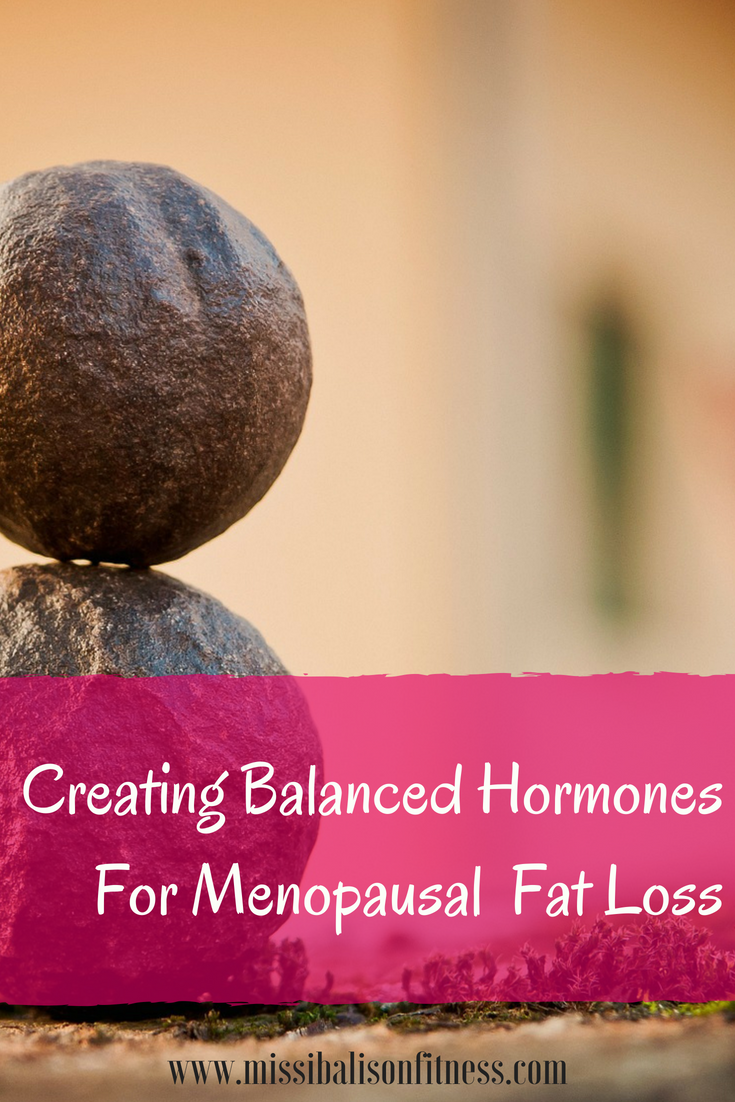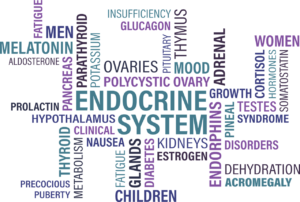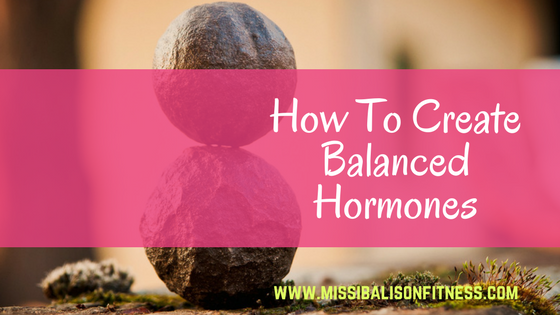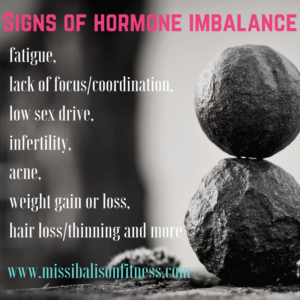So many times we think that fat loss and getting healthy is about calories in versus calories out, adding  the right nutrition and the right amount and kinds of exercise but we forget about the huge impact hormone balance has on our fat loss and overall health. While those things ARE a large part of the equation, hormone balance plays a major role as well and just might be the thing that is holding you back from your goals.
the right nutrition and the right amount and kinds of exercise but we forget about the huge impact hormone balance has on our fat loss and overall health. While those things ARE a large part of the equation, hormone balance plays a major role as well and just might be the thing that is holding you back from your goals.
If you feel like you have been doing “all the things” so diligently and you are frustrated because you are stuck…Stick with me.
This month we are going to dive into how hormones can affect your results and how you can make changes to help bring things back into balance.
What Do The Endocrine Glands Do?
Do you know what your pituitary gland, thyroid, adrenal glands and pancreas have in common? They are all endocrine glands, and their jobs are to make hormones. I am going to give you a brief explanation of what each of these glands does for you so that you can begin to understand the importance of taking care of them. Please know, there are more glands in the body but we will focus on these today.
The pituitary gland
If you have done and research on these glands you may have heard of the pituitary gland referred to as “The Master Gland”. This is because it controls several other hormone glands in your body, including the thyroid and adrenals, the ovaries and testicles. It is an important link between the nervous and endocrine systems and releases many hormones which affect growth, sexual development, metabolism and human reproduction. If your pituitary gland is not producing sufficient amounts of one or more hormones this is called hypo-pituitarism.
The thyroid gland
The thyroid gland is a butterfly shaped gland located in the front of your neck. It stores and produces hormones that affect the function of virtually every organ in our bodies. Thyroid hormone (Triiodothyronine or T3) regulates our metabolic rate and is associated with changes in body weight and energy levels. The thyroid gland plays a huge role in our body, influencing the function of many of the body’s organs, including the heart, brain, liver, kidneys and skin. Many people with disregulated thyroid hormones report weight gain, difficulty losing weight, hair loss, dry skin and sluggishness. You can easily see why having issues with this gland can really make life uncomfortable.
 The adrenal glands
The adrenal glands
The adrenal glands are a triangular shaped gland that sit on top of each kidney. They are VERY important in women’s health as they produce hormones that you can’t live without, including sex hormones and cortisol. Cortisol gives you energy, wakes you up in the morning, gives you the drive to run from a lion (just in case) and helps you respond to stress to name just a few of it’s functions. In the situation of adrenal gland disorders, your adrenals make either too much or not enough hormones. The problem here for menopausal women is that when we run out of Estrogen, the adrenal glands can help pick up some of the load. If we run our adrenals down earlier in life we will have a harder time as we navigate through menopause. (The theme for August will conveniently be … Stress reduction 🙂
The pancreas
The pancreas is responsible for producing enzymes, or digestive juices, that are secreted into the small intestine to further break down food after it has left the stomach. It’s other major role is to produce the hormone insulin and secretes it into the bloodstream to regulate the body’s blood sugar levels. We’ll learn how this relates to fat loss later on in the post.
What Do Hormones Do?
Hormones are chemicals that deliver messages throughout your entire body via the bloodstream. These  messages are delivered to your tissues and organs, but they are very specific: only those cells which are sensitive to that particular hormone will accept it and be activated by it.
messages are delivered to your tissues and organs, but they are very specific: only those cells which are sensitive to that particular hormone will accept it and be activated by it.
Because they are so powerful,, it only takes a very small amount to initiate a significant and impressive response in the body. Hormones cannot be stored; they have to be produced and released at the precise moment they are needed. Therefore, in order to maintain balance within the systems in your body, this maintenance must continually be fine-tuned.
An ongoing, intricate system of checks and balances is happening every minute of every day. It’s not really a “set it and forget it process” like we often like to think.
If the level of one hormone increases too much, your body may release a different hormone to restore the balance necessary for proper mental and physical functions in your body. There is constant communication and regulating going on with out you having to do a thing. So amazing.
It is very easy to forget that these hormones are running in the background every minute of every day. The foods we feed our body, the sleep we get (or don’t get), the environment we surround ourselves with and the stress we put ourselves under all play a roll in the amount of hormones we produce AND how our body receives their messages.
When something goes wrong!
When this system of checks and balances fails to keep your hormones at just the right levels and limits, hormone imbalance results. Hormone imbalance can happen at any age, but it is most common among adults who are beyond middle age. When hormones become unbalanced, it can have a profound impact on your life quality, both physically and mentally. Some of these symptoms include:
- fatigue,
- lack of focus/coordination,
- low sex drive,
- infertility
- acne,
- weight gain or loss,
- hair loss/thinning and more.
Symptoms of poor hormonal balance:
Below have listed just a few of the symptoms that can be associated with certain hormone deficiencies. Please know that there are a lot more potential symptoms, symptoms can overlap and that one hormone imbalance can affect another glands production of it’s hormone. I want you to look at this list as a place to begin looking for a solution to any health or hormone imbalances you may have
Estrogen
Estrogen levels begin to fall at menopause. Women experiencing an imbalance of estrogen and progesterone may suffer from:
- Weight gain,
- Decline in bone density and muscle mass
- Fatigue
- Hot flashes
- Night sweats
- Vaginal dryness or itching
- Loss of libido or sex drive
- Moodiness
… Ringing any bells?
Progesterone
Progesterone plays an important role in maintaining pregnancy. It is produced in the ovaries, the placenta (during pregnancy) and the adrenal glands. A decline in the hormone is a result of menopause. Symptoms of low progesterone include
- Low libido
- Hot flashes
- Headaches or migraines
- Depression, mood changes or anxiety
- Menstrual cycle irregularity or absence
Like many other hormones, progesterone and estrogen hormones play together in some of their functions. When you are lacking enough progesterone, estrogen dominates (estrogen dominance – article coming soon) and this can lead to symptoms such as:
- Depression, mood swings or low libido
- Weight gain
- Heavy bleeding
- Irregular menstrual cycle
- PMS – premenstrual syndrome
- Breast tenderness
Cortisol, the stress hormone, is released when you’re very stressed, reducing progesterone levels
Testosterone
While testosterone belongs to a male class of hormones called androgens, women do have a small amount streaming through their bodies as well. In a female, testosterone is produced in the ovaries along with estrogen.
If too much testosterone is produced in the female body you may have irregular or absent menstrual periods, acne, increased muscle mass, excess body hair (chin hairs anyone?) and deepening of voice. High testosterone levels are often found in women that have a condition known as Poly Cystic Ovarian Syndrome or PCOS. (article coming soon)
Cortisol
Cortisol is known as our “stress hormone” and is made in the adrenal glands. While some cortisol is necessary to give us regulate blood sugar levels, regulate metabolism, help reduce inflammation and assist with memory formulation, too much cortisol can wreck havoc on our hormonal balance.
Cortisol is released when you’re very stressed, reducing progesterone levels. It can also rob a valuable hormone from the thyroid causing a cascade of hormonal reactions there as well.
Very high levels of cortisol in the blood stream can cause Cushing’s syndrome. Those with this syndrome will experience rapid weight gain in the face, abdomen and chest. These people are often identified physically by the individual’s slender arms and legs compared to the heavy weight in the core of the body.
Low levels of cortisol can cause a serious condition called Addison’s disease. Addison’s disease can experience fatigue, muscle loss, weight loss, mood swings and changes to the skin.
I cannot stress enough how important it is to take care of your adrenal glands by implementing any possible relaxation tactics you can… starting today! Women work hard and give to others day after day it is very important that we learn to give back to ourselves for a healthy future.
If I had to pick one thing that had the biggest potential to alleviate menopausal symptoms and make the transition go more smoothly, it would be to reduce stress levels!
Thyroid hormone
An overactive or under-active thyroid can also trigger hormone imbalance. If your thyroid is under-active you may be experiencing:
- Weight gain that you cannot lose.
- Fatigue
- Increased sensitivity to cold
- Constipation
- Dry skin
- Weight gain
- Puffy face
- Hoarseness
- Muscle weakness
- Depression
While an overactive thyroid may result in:
- Sudden weight loss, even when your appetite and the amount and type of food you eat remain the same or even increase
- Rapid heartbeat (tachycardia) — commonly more than 100 beats a minute — irregular heartbeat (arrhythmia) or pounding of your heart (palpitations)
- Increased appetite
- Nervousness, anxiety and irritability
- Tremor — usually a fine trembling in your hands and fingers
- Sweating
- Changes in menstrual patterns
- Increased sensitivity to heat
- Changes in bowel patterns, especially more frequent bowel movements
- An enlarged thyroid gland (goiter), which may appear as a swelling at the base of your neck
- Fatigue, muscle weakness
- Difficulty sleeping
- Skin thinning
- Fine, brittle hair
Hormone balance solutions
When looking for solutions for your hormone imbalance it is essential that we take a step back from the calories in vs calories out model. Constantly restricting calories and increasing exercise amount and intensity in an already stressed out, hormone imbalanced body will only add further stress and exacerbate the problem. This scenario is much the same as your house being on fire but being determined to mow the lawn so it looks great for your next visitors (Does this sound anything like busting your buns to fit in to a bikini for your upcoming vacation? At the same time, this approach will only add to the frustration. Haven’t we all had enough frustration with this whole fat loss thing?
If you are starting to instinctively feel that hormone imbalance is a piece of your health puzzle, it is time to make a commitment to yourself for a closer look.
Here are a few tips for things you can begin to put into play. If you notice that making these simple changes begin to improve the way you feel then you may be on to something and can look into an even deeper level of health.
 Nutrition:
Nutrition:
One of the best things you can do to create a healthy hormone balance is to eat foods that your body knows what to do with.
- Cutting out processed foods, additives, artificial flavors and colors and reducing your sugar intake will go a long way to getting you feeling so much better
- Choose fresh fruits and vegetables, whole grains, nuts, seeds, legumes and lean proteins.
- Reduce or eliminate processed foods such as chips, candy, cookies, white flour and white sugar
Exercise
Of course, eating a healthy diet and getting plenty of exercise are actions you can take right now to help your body cope with any stress it is under. But you do need to be cautions about adding too much intense exercise. You may find that your body, in this hormonally imbalanced state actually responds better to low intensity, restorative exercise such as yoga, walking, stretching.
- Commit to an exercise program, and find someone to keep you accountable. (If you are a Sandpoint local, my clients and I are happy to help WORK WITH ME )
Taking care of your health with a good nutrition, fitness and lifestyle plan will go a long way toward helping to alleviate the symptoms of hormone imbalance. My philosophy is that food is medicine. Cleaning up your nutrition can go a long way to helping your hormones get back into balance….
Deeper solutions for hormone balance
This article was intended to give you an overview of some of the hormonal players in your metabolism and optimal health in relation to menopause. There are lost more hormones that send messages throughout the body.
A reminder
One thing I really want to remind you is that finding your optimal place of health and wellness is all and experiment.
Every BODY will respond to a different method at a given time. Learn to listen to your body’s responses and make adjustments when necessary.
Try hard (and I know this is hard) to not think of these efforts as a “failed attempt”. With each attempt at better health, whether it helped you reach the goals you were setting out to achieve or not, is a successful attempt because you are one step closer to “cracking the code” for YOUR body.
What I have found is that with each new approach you add to your program you’ll need to allow at least 3-4 weeks to determine if it is working for where your body is at this time. Sometimes it might take more, sometimes it might take less.
Take what works, keep it, pitch what doesn’t and keep moving forward. It can also be helpful to practice patience and not try too many new approaches at one time. If you implement several new changes to your program at once it may be difficult to determine which one is causing the results.
Getting more help
One of the things I see quite often is people that know there is something not jiving in their plan but they don’t know which way to turn. My best suggestion for you is to find a practitioner that has a special focus on the endocrine system (the hormone making organs). A Certified Nutritionist or a Functional Diagnostic Nutrition Practitioner can help you take a deeper dive. He/She can run tests specific to your symptoms to get you the help you need in a more direct path. The practitioner will take a look not only at your hormone levels but your lifestyle and past stressors as well to help create a fitting plan for your body’s needs. The key words here are “help YOU find a plan”. A practitioner in these fields will not simply provide you with a plan to execute but educate you. This will empower you with the knowledge to know what to look for and how to make adjustments in the future.
If you are a Sandpoint local I highly recommend visiting Kelly Greenway at Dig Nutrition. You can find her at https://www.facebook.com/KellyGreenwayNTP/
If you are not local and are looking for more help, you can find a Functional Diagnostic Nutritionist in your area at THIS SITE.



